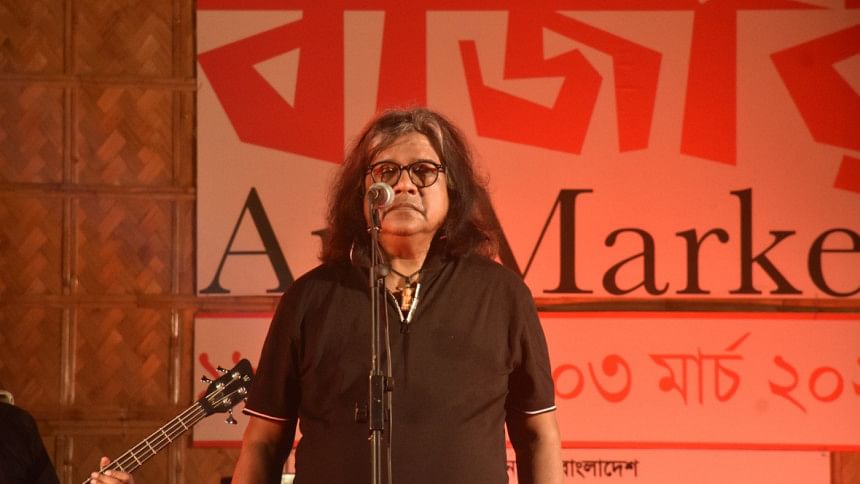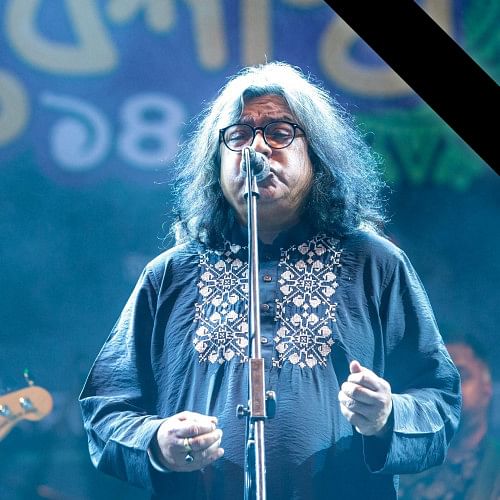Band music in Bangladesh needs official recognition: Maqsoodul Haque

From his journey with Feedback to founding his own band, Maqsood O' dHAKA, Maqsoodul Haque has gifted us with classic hits like "Telephone Jokhon Phish Phish" and anthems such as "Abar Juddho Jete Hobe."
Throughout his career, he deeply immersed himself in folk music, starting with 'Bauliana,' and conducted extensive research in the genre. As a pioneer in Bangladesh's band music scene, he also holds the distinction of being the founding president of the Bangladesh Musical Bands Association (BAMBA).

Through his lyrics, compositions, vocals, research, and leadership, the musician has not only enriched the band music industry of Bangladesh but also helped Bangla music flourish as a whole. In the wake of the anti-discrimination student movement and subsequent changes in society, Haque has put forth specific demands for this new era in Bangladesh.
He has presented a detailed history of band music in Bangladesh to the public and state authorities, illustrating how band music has served as a messenger of progress and anti-discrimination for over five decades. Maqsoodul Haque has one primary demand: official state recognition of band music. As he says, "This is now a demand of the time."

He elaborates, "The journey of band music in Bangladesh began in the 1970s when the winds of change were blowing through the country's political and social landscape. Today, band music is not just confined to entertainment; it has established itself as a powerful medium for inspiring the new generation, contributing to economic prosperity, and raising social awareness in the country," as read in his post.
Maqsoodul Haque further highlighted the importance of band music in Bangladesh's history and socio-economic landscape in his elaborated post. The post read:
The history and rise of band music in Bangladesh
Band music emerged at a time when Bangladesh, newly independent, was charting a fresh course inspired by the spirit of the Liberation War. During this period, young music enthusiasts began expressing their thoughts through innovative melodies, lyrics, and musical arrangements. Their songs reflected not only personal emotions but also various social issues. Alongside themes of love, separation, and sorrow, they boldly addressed social injustices and political instability. Moreover, elements of Bengali history and culture also began to feature prominently in band music.
The message of the Liberation War and patriotism
The spirit of the Liberation War and patriotism are core themes of band music in Bangladesh. Songs composed during and after the War emphasised love for the country, struggle, and sacrifice. For example, Azam Khan energised the youth in the post-War period with his songs, which carried a clear message of patriotism and continue to inspire new generations.
Inspiring the new generation
Bangladeshi band music has always conveyed a message of revolution to generations. It has played a significant role in fostering independent thinking among the youth, introducing new trends, and raising awareness about various social issues. The songs of Bangladeshi bands have presented political, social, and personal themes in ways that resonate with young people, helping them find their voices. The language, lyrics, melodies, and powerful messages of band music have inspired young people in various aspects of their lives and motivated them to bring about social change.
Contribution to the economy
Band music contributes significantly to Bangladesh's economy, beyond its cultural impact. The sales of band music through concerts, albums, and digital platforms have added a new dimension to the economy. Regular band concerts in various cities provide entertainment and stimulate economic activity, attracting large audiences and generating income for artistes, sound engineers, event managers, and other personnel. Brand sponsorships and media promotions related to band music also play a crucial role in boosting the country's economy.
Foreign currency inflow
Bangladeshi band music has transcended national borders, reaching audiences worldwide. Millions of people globally listen to Bangladeshi band music on platforms like YouTube and Spotify, generating significant foreign currency inflow. This has helped build numerous young careers. Additionally, Bangladeshi bands are invited to perform in various countries, including the USA, Canada, Australia, and Europe. By holding live concerts abroad, they not only bring in valuable foreign currency but also deliver a piece of Bangladesh to the Bangladeshi people worldwide.
Role in modernising and developing music
Over time, music has undergone global modernisation, and Bangladeshi bands have played a vital role in this transformation by adapting to contemporary musical trends, learning new instruments like guitars, keyboards, and drums, and mastering these skills. Today, artistes engaged in various genres such as Rabindra Sangeet, Nazrul Geeti, modern songs, and folk music are also proficient in playing multiple instruments, thanks in part to the influence of band music. Band members have directly or indirectly contributed to their musical education.
Creating social awareness
Bangladeshi band music has been a pioneer in raising social awareness. Bands have addressed numerous social issues through their songs, such as the eradication of drug addiction, the prevention of violence against women, the establishment of women's rights, political corruption, the elimination of superstition, and environmental awareness. These songs have highlighted societal challenges and raised public awareness. Band music has served not only as entertainment but also as an effective medium for drawing attention to various social issues.

The need for official recognition
Band music is an integral part of Bangladesh's cultural heritage. Artists in this genre contribute not only to entertainment but also significantly to the nation's culture, society, and economy. Yet, band music has not been officially recognised by the state. There are no national awards or official recognition for artistes in this medium. While others who contribute to society receive state honours and various benefits, band musicians are often overlooked, even being excluded from invitations to state events.
The time has come for official recognition of band musicians, granting them state opportunities and benefits. They have earned this right. Such recognition would honour these artistes' contributions, further enrich the country's culture, and inspire the younger generation in Bangladesh to pursue music professionally, contributing positively to the country's music scene with their talents and skills.

 For all latest news, follow The Daily Star's Google News channel.
For all latest news, follow The Daily Star's Google News channel. 








Comments